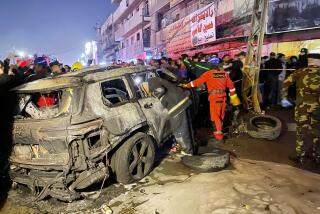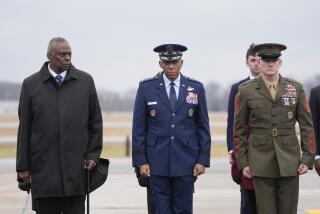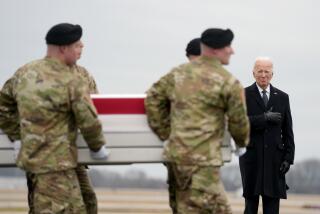Al Qaeda’s No. 2 killed in Pakistan by CIA drone strike
WASHINGTON — CIA drone strikes have killed Al Qaeda’s No. 2 leader, Abu Yahya al Libi, and at least two other people in a rural village in northwestern Pakistan in what U.S. officials called a major blow to the battered core leadership of the terrorist network.
The CIA had targeted Libi with three separate drone-launched missile attacks over three days, finally succeeding early Monday in strikes that destroyed a house and a vehicle, U.S. and Pakistani officials said.
The Libyan-born commander escaped from a U.S. detention facility in Afghanistan in 2005 and later used online video messages to call for attacks on the United States, burnishing a reputation among militants as a charismatic leader and a prolific propagandist.
TIMELINE: Notable targeted killings under President Obama
But relations between the U.S. and Pakistan were further inflamed by this latest strike, part of a surge in Predator drone attacks in recent weeks. Pakistan’s government has condemned the CIA’s use of such aircraft, which has killed civilians and which it says has provided a recruiting tool for insurgents.
On Tuesday, Pakistan’s Foreign Ministry summoned U.S. Deputy Ambassador Richard Hoagland to lodge a formal protest.
The attacks “represented a clear red line for Pakistan,” the ministry said in a statement. Hoagland “was informed that the drone strikes were unlawful, against international law and a violation of Pakistan’s sovereignty. Parliament had emphatically stated that they were unacceptable.”
Libi, who was believed to be in his late 40s, was the second top Al Qaeda deputy killed since U.S. NavySEALs killed Osama bin Laden in a raid in the Pakistani city of Abbottabad in May 2011.
Bin Laden’s longtime deputy, Ayman Zawahiri, initially named Atiyah Abdul Rahman as second in command. But a CIA drone missile killed Rahman in August, and Libi, another Libyan, was chosen as his replacement.
Libi has not been publicly linked to a specific terrorist act, but he “played a critical role in the group’s planning against the West, providing oversight of the external operations efforts,” according to a U.S. official who confirmed the death but was not authorized to discuss the matter publicly.
“Zawahiri will be hard-pressed to find any one person who can readily step into [Libi’s] shoes,” the official said.
Libi’s “religious credentials gave him the authority to issue fatwas, operational approvals and guidance to the core Al Qaeda group in Pakistan and regional affiliates,” the official said. “There is no one who even comes close in terms of replacing the expertise [Al Qaeda] has just lost.”
The U.S. official would not say how the CIA had confirmed Libi’s death. The State Department had offered a $1-million reward for information leading to his death or capture.
Jarret Brachman, a counter-terrorism scholar and government consultant, said Libi was more popular and more influential than Zawahiri, the leader of Al Qaeda, and his death may be significant.
“He was the only guy who could have saved Al Qaeda,” said Brachman, who interviewed Libi’s older brother in a Libyan prison in 2010.
A media-savvy religious scholar, Libi turned his 2005 escape from the U.S. detention facility at Bagram air base into legend among militants, highlighting it in videos posted on the Internet.
“They picked locks and slipped under concertina wire,” Brachman said. When they saw U.S. soldiers, the escapees stripped off their shirts and picked up pieces of lumber, posing as contract laborers.
Libi’s experience in U.S. custody left him thirsty for revenge, Brachman said.
He was killed in Hesokhel, a small village in North Waziristan. The tribal region is a stronghold for Al Qaeda, the Taliban, the Haqqani terrorist network and other militant groups.
Reports from Pakistan said as many as 15 people were killed in the drone strikes. The U.S. official said that figure was “wildly inaccurate” and insisted that the death toll was “less than a handful.”
Disparate death tallies have become common in the CIA drone attacks, which strike in remote and dangerous areas of Pakistan and Yemen where journalists and independent monitors cannot easily operate.
The CIA has launched 21 drone attacks in Pakistan this year, compared with 64 for all of last year and 117 in 2010, according to Long War Journal, a website that tracks the strikes.
TIMELINE: Notable targeted killings under President Obama
Despite widespread public opposition to the attacks, Pakistan’s air force has not sought to stop U.S. drones from flying.
“Even if we shot down one or two, what then?” a Pakistani official asked. “Can you shoot down the whole fleet? We are talking, and we hope to find a solution to this.”
After errant U.S. airstrikes killed 24 Pakistani soldiers near the Afghan border in November, Islamabad halted truck convoys used to supply U.S. and other NATO troops fighting in neighboring Afghanistan. Negotiations to reopen the supply routes appear to have stalled.
Dilanian reported from Washington and Rodriguez from Islamabad, Pakistan. Special correspondent Zulfiqar Ali reported from Peshawar, Pakistan.
More to Read
Start your day right
Sign up for Essential California for news, features and recommendations from the L.A. Times and beyond in your inbox six days a week.
You may occasionally receive promotional content from the Los Angeles Times.







